The #1 Roadblock to Being Your Authentic Self
“Be yourself.” We hear this all the time. In fact, when I was applying to medical school, this was the number one piece of advice for interviews. I’ve thought a lot about what it means to be authentic since then, and I’ve come to realize that being yourself is much harder than it sounds.
Competing Needs
One of our inherent needs as humans is to be authentic. When I am able to be my true self, I feel alive. It’s happiness ― pure and simple. When I have to put on a face for the people around me, I experience stress. It’s fight or flight, and I want to get out. This drive to be authentic is natural.
So, if the need to be authentic is innate, then why is it so hard? The problem is that the need to be authentic often conflicts with other more urgent needs. According to Abraham Maslow’s hierarchy of needs, we have 5 primary needs as humans:
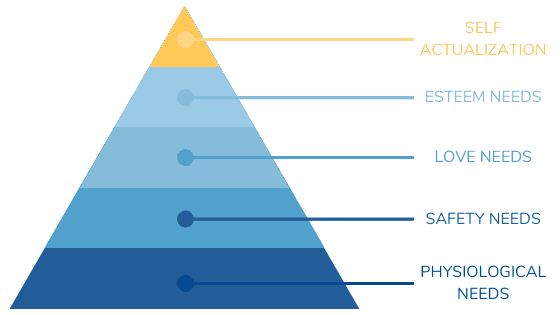
Maslow suggests that before we can give a need our full attention, we must satisfy lower level needs first. For instance, if you haven’t eaten in several days, you may be willing to sacrifice your need for safety in order to obtain food. Hence, why early humans would be willing to risk their lives to hunt a wooly mammoth.
Self-actualization is our highest-level need, and it entails being one’s true and best self. For this reason, our need for self-actualization includes our need for authenticity. So, while our need for authenticity is an essential part of one of our greatest needs as humans, it is also one of our lowest priorities since the lower-level needs take precedence:
Physiological Needs. If you don’t have adequate air, water, food, shelter, sleep, or clothing, being authentic is likely the last thing on your mind.
Safety Needs. If you are in danger, unemployed, or suffering from a serious health issue, you may be willing to fake your way through a job interview.
Love Needs. If you are feeling lonely, it wouldn’t be unusual to put on the face you think you need to present in order to get the affection you are longing for.
Esteem Needs. If you worry that people might not hold you in high esteem, you may end up hiding the parts of you that wouldn’t receive respect from the people around you.
Looking over this list, you may recall times in your life when you’ve had to “fake it to make it.” Because these needs are part of our inherent human nature, we all do this from time to time. But, just because something is natural doesn't make it beneficial. If being your true and best self is your ultimate goal, you have to be willing to go against your primal instincts.
If being your true and best self is your ultimate goal, you have to be willing to go against your primal instincts.
When you fake who you are in order to get your lower-level needs met, you are essentially climbing up the wrong mountain. And when you get to the top, you’ll find that self-actualization isn’t even there. You are standing on a throne of lies.
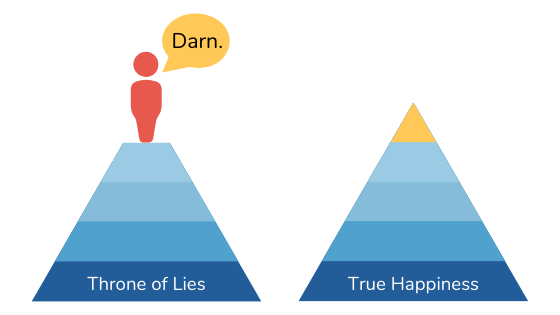
You’ll have to make the humbling trek back to the bottom of the mountain, and start up your own mountain, putting in the real work required for true happiness.
Counterfeit Love/Esteem
This sounds like a simple solution, but leaving your throne of lies can be very hard to do. I mean, hey, you are almost at the top! You have food, safety, love, and esteem. Why leave it behind?
Let me give you an analogy. Clever monkey hunters in Africa can catch a monkey with just a peanut in a jar. When the monkey reaches in and grabs the peanut, it’s fist is now too big to pull out of the jar. Instead of leaving, the monkey stays, giving its life for a peanut it can’t even eat.
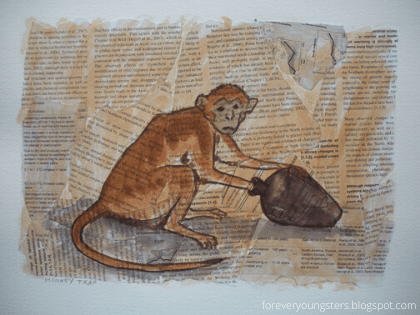
When you fake it to make it, you think you have love and esteem, but you really don’t. People may be giving you the love/respect that you crave, but deep down you know that they are not loving/respecting the real you. They are loving/respecting the face you are putting on:
“We all want to be liked, of course. But the more we do to influence the verdict, the less fulfilling the verdict becomes. If we are successful in getting a good verdict, it is only what we did that was liked, or the impression we have created that is liked, not our true selves. So our insecurity grows—and with it our obsession with image management. It is an ever-escalating cycle."1
By leaving the throne of lies, you can find true love, real esteem and authentic happiness, but you are scared to let go of the counterfeit love/esteem you now hold. You think you have what you need, but like the monkey, what you hold will never satisfy you.
This tendency to hold on is the number one obstacle to being authentic. There are 3 primary reasons why it is so hard to let go of counterfeit love/esteem:
- It’s a Sunk Cost
- It’s Addictive
- It’s Easier

1. It’s a Sunk Cost
The more you’ve invested into something, the harder it is to give it up. This is known as the Sunk Cost Effect. It explains why people make poor decisions such as gambling away their last $100 because they’ve already “invested” $900. Even though the $900 is a sunk cost (i.e. it can’t be redeemed), the gambler is factoring it into their future decision-making. It’s not logical, but we all do it.
For instance, I bought a movie the other day, and after the first 5 minutes of watching it, I could tell I wasn’t going to like it. But, hey, I’d already paid for it and already started watching it, so I just kept watching. Only once the movie was halfway over did I finally call it quits. Do you see why my initial decision to keep watching wasn’t logical? The money I’d spent and the initial 5 minutes of watching were sunk costs, lost to the past. Yet, I factored them into my future-oriented decision. Continuing to watch the movie only resulted in the loss of more time.
We are especially prone to fall prey to the sunk cost effect in our relationships whether it is a friendship, family relationship, or a marriage. Because you’ve invested so much time into these relationships, it is hard to risk losing them.
As a personal example, I recently went through a faith crisis, which led me to no longer believe in my childhood religion. My spouse, my parents, my close friends, most of my extended family, and the majority of my social network belong to this religion. Opening up about my new belief system had the potential to splinter almost every relationship I’ve invested in. This made it very hard for me to sum up the courage to be authentic.

2. It’s Addictive
Like empty calories, counterfeit love/esteem is addictive. Think about eating girl scout cookies. Each cookie you eat, just makes you want to eat another. You eat and eat but never end up satisfied.
Similarly, when we receive counterfeit love/esteem, we experience momentary pleasure, but our deep emptiness remains. Afterall, “It is difficult to get enough of something that almost works.”2 In essence, we are sacrificing our long-term happiness for each addictive buzz of dopamine:
"Me + validation = perceived happiness. It’s not actual happiness. It’s fake and doesn’t mean anything, because you’re just adjusting yourself to make other people happy. Not yourself. Receiving that dose of validation would lead to me wanting more, requiring more."3
3. It’s Easier
Ever heard the proverb “A bird in the hand is worth two in the bush”? When you have counterfeit love/esteem in your hand, holding onto it is much easier than putting in the work required to chase down authentic love, esteem, and happiness (See "How to be Happy Right NOW").
Hanging out with the same group of friends, even if you have to fake who you are to be around them, feels easier than starting from scratch. Continuing to post what you think other people want to hear on social media is easier than posting your true feelings, losing all your followers, and rebuilding your tribe. And putting on a face to continue impressing your significant other is certainly easier than a breakup, cartons of ice cream, and revisiting the dating scene.
But remember, counterfeit love/esteem will never provide you with what you are really longing for. Like the monkey, your hand is holding onto something that will never satisfy. It will only destroy you.

Starting Your Journey to Authenticity
Now, at this point you may be tempted to go crazy and start posting “unpopular opinions” all over Facebook, telling your boss how you really feel, and opening up to your significant other about everything. Instead, I’d recommend a much more gradual approach.
At the end of each day, simply take a moment to reflect on which situations brought out your true self and which situations didn’t. It may help to keep track in a journal.
For situations in which you didn’t feel like yourself, decide on one thing you can do the next time you are in that situation to be more true to yourself. If doing that thing makes you feel totally uncomfortable, you may want to consider avoiding that situation for a little while.
For situations that bring out your true self, consider how you can spend more time in these situations. In essence, your goal is to increase the amount of time you spend in authenticity-promoting situations and decrease the amount of time you spend in authenticity-diminishing situations. This will increase, what I call, your authenticity ratio.
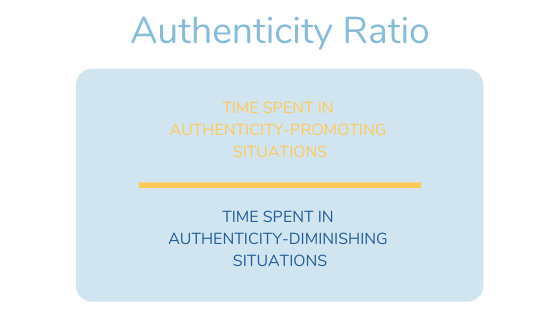
As you slowly increase your authenticity ratio, your life will gradually fill up with genuine love, esteem, and happiness: "Start sharing more of the real you with the world, and you’ll find that you’ll become strong enough to deal with the consequences, and lead a happier life."4 The people who love you will really love you. When you are respected by others, it’s actually you they will be admiring. When you reach the most important goals in your life, you will feel a deep sense of meaning because they were truly your goals. Goodbye throne of lies!
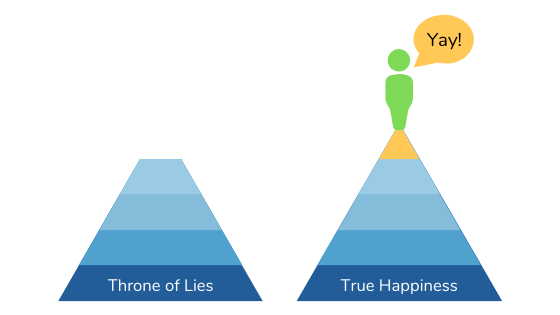
Becoming authentic isn’t easy, and it’s not going to happen overnight. That’s okay. Just make tomorrow a little more authentic than today, and you’ll be on the right track. I know you can do it!
Hi fellow human! Thanks for visiting my personal blog. I’m an intentional family man who is currently passionate about parenting, family culture, homeschooling, and self improvement. This blog isn’t a business. It’s just my way of connecting with people with just as much passion for these topics as me. So, if you enjoy my musings, be sure to reach out.
- Hold Onto Your Kids by Gordon Neufield and Gabor Maté
- Vincent Felitti
- "Learning to be Authentic" by Victoria Dmitruczyk
- "3 Essential Steps To Becoming More Authentic In Life And Work" by Kathy Caprino

